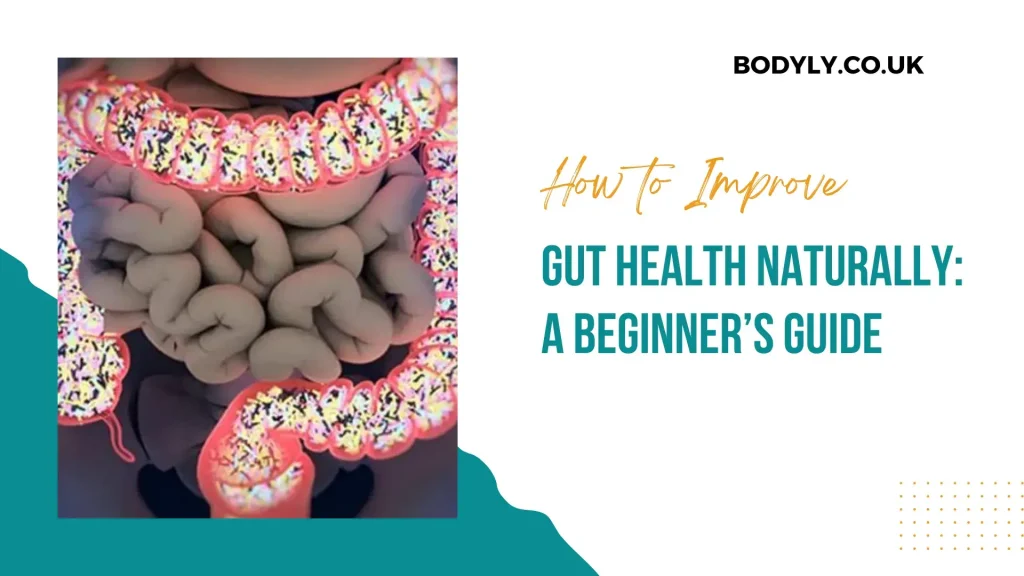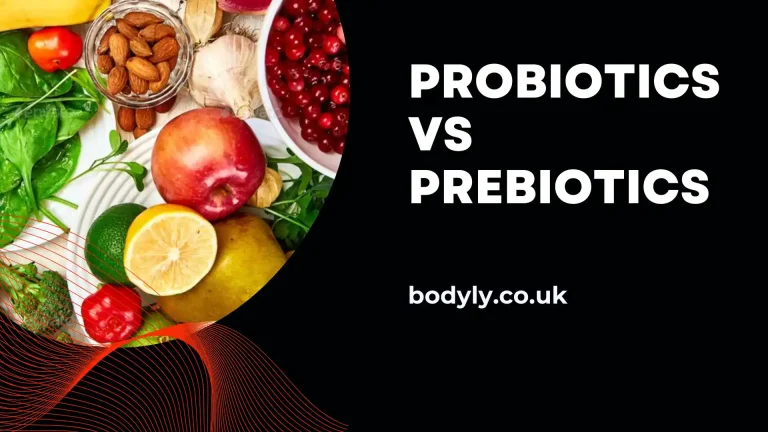How to Improve Gut Health Naturally: A Beginner’s Guide (2024)
I remember when I first stumbled upon the concept of gut health. I was dealing with constant bloating and mood swings, feeling like a human balloon one minute and a grumpy cat the next. Little did I know, my gut was trying to tell me something!
Here’s a mind-blowing fact for you: A recent study in Cell (yeah, I’m a science nerd, sue me) found that over 70% of our immune system hangs out in our gut. That’s like having a superhero headquarters right in your belly!

But don’t worry if all this gut talk has your head spinning. I’ve been there, done that, and now I’m here to be your gut health guru. This guide is your ticket to understanding and improving your gut health, no Ph.D. required. So, grab a kombucha (or whatever floats your boat), and let’s dive into the wonderful world of gut health! Trust me, your belly will thank you later. 😉
Understanding the Gut Microbiome: Your Body’s Hidden Universe
Let’s dive into the fascinating world of your gut microbiome. Trust me, it’s way more exciting than it sounds!
What in the world is the gut microbiome?
Imagine a bustling city living inside your intestines. That’s essentially what your gut microbiome is – a complex community of trillions of microorganisms, mostly bacteria, but also fungi and viruses. It’s like New York City in your belly, but instead of taxis and hot dog stands, you’ve got beneficial bacteria and yeasts.
I remember when I first learned about this internal ecosystem. I was mind-blown! To think that all these tiny critters were living inside me, affecting my health in ways I couldn’t even see. It made me look at my body in a whole new light.
The secret life of gut bacteria: More than just digestion deputies
These little guys aren’t just hanging out, twiddling their microscopic thumbs. They’re hard at work! Sure, they help break down your food, but that’s just the tip of the iceberg.
Did you know your gut bacteria produce vitamins? Yep, some of your B vitamins and vitamin K come courtesy of your gut tenants. They also play a crucial role in your immune system. In fact, about 70% of your immune system resides in your gut. Mind-boggling, right?
But wait, there’s more! These bacteria even influence your mood and mental health. Ever had a “gut feeling”? Well, there’s science behind that! Your gut and brain are in constant communication, like two best friends who can’t stop texting each other.
Gut health saboteurs: What’s messing with your microbiome?
Now, here’s where things can go south. Your gut microbiome is delicate, like a carefully balanced ecosystem. And just like any ecosystem, it can be disrupted.
The biggest troublemakers? Poor diet (I’m looking at you, processed foods), stress (hello, modern life), lack of sleep (guilty as charged), and certain medications, especially antibiotics.
I learned this the hard way after a round of antibiotics for a nasty sinus infection. My digestion went haywire, and I felt off for weeks. It was like my internal city was going through a major reconstruction project!
Red flags: How your gut screams “Help!” without actually screaming
Your gut has its own way of sending out SOS signals. The tricky part? Learning to interpret them.
Bloating, gas, and irregular bowel movements are obvious signs. But did you know that skin issues, frequent infections, and even mood swings can be tied to gut health?
I used to think my afternoon energy crashes were just part of life. Turns out, they were my gut’s way of telling me something was off. Once I started paying attention to these signals and made some changes (hello, fermented foods!), it was like someone turned on the lights in my body.
Remember, your gut is as unique as your fingerprint. What works for your best friend might not work for you. It’s all about tuning in to your body’s signals and giving your gut the TLC it deserves.
So, next time you feel a rumble in your tummy, don’t just brush it off. Your gut might be trying to tell you something important. Listen up – your internal city will thank you!
The Power of a Gut-Friendly Diet: You Are What You Eat (Literally)
Alright, let’s talk grub. What you put on your plate can make or break your gut health. Time to give your inner ecosystem the five-star treatment it deserves!

Gut-loving foods: Your microbiome’s best friends
Picture your gut bacteria as tiny foodies, always on the lookout for their next gourmet meal. What’s on the menu? Variety, my friends. The more diverse your diet, the happier your gut.
Leafy greens are like the holy grail for your gut. Spinach, kale, Swiss chard – your bacteria go nuts for these. I used to hate kale until I discovered massaged kale salads. Game changer! Now I feel like Popeye every time I munch on those green leaves.
Don’t forget about colorful fruits and veggies. Berries, apples, carrots, sweet potatoes – they’re all packed with fiber and antioxidants that make your gut do a happy dance. Think of your plate as a rainbow. The more colors, the merrier your microbiome!
Find out the difference between Probiotics and Prebiotics here.
The importance of fiber and prebiotics
Fiber is like the street sweeper of your gut, keeping everything moving smoothly. But it’s also food for your good bacteria. Pretty cool, huh?
Prebiotics are a special type of fiber that your gut bacteria absolutely love. You can find them in foods like garlic, onions, leeks, and asparagus. Fair warning: your breath might suffer, but your gut will thank you!
I remember when I first started upping my fiber intake. Let’s just say… things got a bit windy. But stick with it! Your body adjusts, and the benefits are totally worth a few awkward moments.
Probiotic-rich foods to include in your diet
Now, let’s talk about probiotics – the good bacteria themselves. You can find these little helpers in fermented foods like yogurt, kefir, sauerkraut, and kimchi.
I’ll never forget my first encounter with kimchi. The smell hit me like a ton of bricks! But once I got past the initial shock, I discovered a world of tangy, spicy deliciousness. Now, I’m that weird friend who always has a jar of something fermenting on the kitchen counter.
If you’re new to fermented foods, start slow. A spoonful of yogurt here, a forkful of sauerkraut there. Your taste buds (and your gut) will adapt over time.
Foods to avoid for better gut health
Now for the party poopers. Processed foods, excessive sugar, and too much red meat can wreak havoc on your gut flora.
I used to be a sucker for late-night ice cream binges. But I noticed that every time I overindulged, my stomach would rebel the next day. It was like a civil war in my gut! Now, I try to keep these foods as occasional treats rather than daily staples.
Alcohol and caffeine can also be troublemakers in large amounts. I’m not saying you need to give up your morning coffee or Friday night wine, but moderation is key. Your gut will thank you for it.
Remember, changing your diet doesn’t happen overnight. It’s a journey, not a sprint. Start with small changes, be patient with yourself, and don’t forget to enjoy your food. After all, stress is bad for digestion too!
So, next time you’re planning your meals, think about your tiny gut residents. What would make them do a happy bacteria dance? Your microbiome’s satisfaction might just be the key to your own!
Lifestyle Changes for a Healthier Gut: It’s Not Just What You Eat, It’s How You Live
Alright, folks, buckle up! We’re about to dive into the lifestyle factors that can make or break your gut health. Trust me, your gut cares about way more than just what’s on your plate.
Stress and your gut: Why your belly hates your busy schedule
Ever noticed how your stomach does somersaults before a big presentation? That’s your gut and brain having a not-so-pleasant conversation.
Chronic stress is like a constant fire drill for your gut bacteria. It messes with digestion, increases inflammation, and can even change the composition of your gut flora. Not cool, stress. Not cool at all.
I learned this the hard way during my last job. The constant deadlines and pressure had my stomach in knots. I’d wolf down my lunch at my desk, barely tasting it. My gut was not happy, and it let me know loud and clear.
So, what’s a stressed-out person to do? Find ways to chill out that work for you. For me, it’s yoga and mindful breathing. For you, it might be painting, gardening, or belting out show tunes in the shower. Whatever floats your boat and calms your gut!
Move it or lose it: How exercise keeps your gut grooving
Here’s a fun fact: exercise isn’t just good for your muscles and heart. It’s also a VIP pass to a healthier gut!
Regular physical activity can increase the diversity of your gut bacteria. It’s like hosting a microbial block party in your intestines!
Now, I’m not saying you need to become a marathon runner overnight. Even a daily walk can make a difference. I started with just 15 minutes of movement a day. Now, I’m that crazy person who actually looks forward to my morning jog. (Past me would be shocked!)
Beauty sleep for your bacteria: The gut-sleep connection
Turns out, your gut bacteria have their own internal clock. When you mess with their sleep schedule, it’s like subjecting them to constant jet lag. Poor little guys!
Aim for 7-9 hours of quality shut-eye. Your gut (and your morning mood) will thank you. I used to be a proud night owl until I realized how much better my digestion was when I got proper sleep. Now, my bedtime routine is sacred. (Yes, I’ve become that person who gets excited about early nights. Send help!)
Hydration station: Why your gut loves H2O
Water is like a waterslide for all the good stuff in your gut. It keeps things moving smoothly and helps prevent constipation. (Sorry for the TMI, but hey, we’re all friends here!)
I used to be terrible at staying hydrated until I got a water bottle with time markers. Now it’s like a game to hit my water goals. My gut’s happier, my skin’s clearer, and I make way too many trips to the bathroom. But it’s worth it!
Remember, these changes don’t happen overnight. It’s all about small, consistent steps. Be patient with yourself. Your gut has been with you your whole life – it can wait a little longer for you to get your act together. Here’s to happier, healthier guts!
Natural Supplements for Gut Health: A Little Extra Boost
Alright, gut health enthusiasts, let’s talk supplements! Sometimes, despite our best efforts with diet and lifestyle, our guts need a little extra TLC. That’s where supplements come in. But fair warning: navigating the supplement aisle can feel like trying to decipher an ancient language. Trust me, I’ve been there, googling frantically on my phone in the middle of the health food store!
Probiotic supplements: Bacterial reinforcements in a bottle
Probiotics are like the special forces for your gut – they come in to support your existing gut bacteria and help restore balance. But here’s the kicker: not all probiotics are created equal.
When I first started taking probiotics, I just grabbed the first bottle I saw. Big mistake! I learned the hard way that you need to look for a few key things:
- Variety of strains: Different strains do different jobs. Look for a supplement with multiple strains for a broader impact.
- CFU count: This stands for Colony Forming Units. Basically, it tells you how many live bacteria you’re getting. Aim for at least 1 billion CFU.
- Survivability: Those little bacteria need to survive the acid in your stomach to reach your intestines. Look for brands that use technology to protect the probiotics.
My personal game-changer was finding a probiotic that didn’t need refrigeration. No more forgetting my probiotics in the fridge when traveling!
A word of caution though: starting probiotics can sometimes lead to temporary bloating or gas. It’s like your gut bacteria are having a welcome party for the newcomers. Stick with it, start with a lower dose, and your body should adjust.
Digestive enzymes: Your stomach’s little helpers
Imagine tiny little workers in your stomach, breaking down your food. That’s essentially what digestive enzymes do. They’re particularly helpful if you have trouble digesting certain foods.
I discovered digestive enzymes after a particularly nasty bout of food poisoning left my gut feeling like a war zone. These little powerhouses helped me digest my food better while my system was recovering.
Here are some common digestive enzymes to look out for:
- Lipase: Helps break down fats
- Amylase: Tackles carbohydrates
- Protease: Works on proteins
- Lactase: The savior for those who love dairy but whose bodies don’t!
I now keep a bottle of broad-spectrum digestive enzymes in my bag for those times I indulge in a heavy meal or try new foods while traveling. They’re like my little security blanket for my gut!
Herbal allies: Mother Nature’s gut-loving gifts
Herbs have been used for centuries to soothe upset tummies and support digestion. Here are a few that have become my go-to gut helpers:
- Peppermint: Great for relieving gas and bloating. I love sipping on peppermint tea after a big meal.
- Ginger: A superstar for nausea and inflammation. I always pack some ginger chews when I travel.
- Slippery Elm: This one’s great for soothing the digestive tract. It’s become my secret weapon for occasional heartburn.
- Marshmallow Root: Despite its name, it’s not for making s’mores! It’s excellent for coating and soothing the digestive tract.
My grandmother always said, “Nature has a cure for everything.” Turns out, she was onto something! But remember, even natural supplements can be powerful. Always check with a healthcare professional before starting any new herbal regimen, especially if you’re on medication.
Supplement smarts: Choosing the right gut boosters
With so many options out there, choosing the right supplements can feel overwhelming. Here are some tips I’ve learned (often the hard way):
- Quality matters: Cheap supplements might save you money, but they could be less effective or even contain harmful additives. I learned this after wasting money on bargain bin probiotics that did absolutely nothing for me.
- Read labels carefully: Look for supplements free from unnecessary fillers, artificial colors, or potential allergens.
- Start slow: Introduce one supplement at a time. This way, you can tell what’s working (or if something doesn’t agree with you).
- Be patient: Unlike medications, supplements often take time to show effects. Give it at least a few weeks before deciding if it’s working for you.
- Keep a gut health journal: This has been a game-changer for me. I note what supplements I’m taking, any changes in diet or lifestyle, and how I’m feeling. It’s helped me spot patterns and figure out what really works for my gut.
Remember, supplements are meant to supplement, not replace, a healthy diet and lifestyle. They’re not a magic pill (unfortunately!). I once thought I could pop some probiotics and then continue my junk food habits. Spoiler alert: it doesn’t work that way!
Lastly, always, always consult with a healthcare professional before starting any new supplement regimen, especially if you have existing health conditions or are taking medications. Your gut is unique, and what works for your best friend (or some random internet stranger) might not work for you.
Your gut health journey is just that – a journey. There might be some trial and error involved, but don’t get discouraged. Keep listening to your body, and don’t be afraid to advocate for your gut health. Here’s to happy, healthy tummies!
Conclusion:
Whew! We’ve been on quite the gut health journey, haven’t we? From understanding the bustling world of your microbiome to learning about gut-friendly foods and lifestyle tweaks, you’re now armed with a toolkit to show your gut some serious love.
Remember when we talked about how 70% of your immune system hangs out in your gut? Well, by taking steps to improve your gut health, you’re not just aiming for better digestion – you’re potentially boosting your mood, strengthening your immune system, and giving your overall well-being a high-five.
So, what’s your gut telling you to do next? Maybe it’s time to try that kimchi recipe you’ve been eyeing (pro tip: start small!), or finally dust off those yoga pants. Whatever it is, know that every small step counts. Your gut didn’t get into its current state overnight, and it won’t transform overnight either. Be patient with yourself and celebrate the small victories!
Remember, you’re unique, and so is your gut. Don’t be afraid to experiment and find what works best for you. It’s all about progress, not perfection. And hey, if you’re dealing with persistent gut issues, don’t hesitate to chat with a healthcare pro. They’re like gut health detectives, ready to help you solve the mystery.
Here’s to happy guts and healthier lives! Now, if you’ll excuse me, I have a date with some homemade sauerkraut. Wish me luck! 🥬🥕🎉
Tanveer Quraishi, author of Steroids 101 has extensive experience in the field of bodybuilding and has been writing online on various muscle-building and other health topics for many years now. He is not just interested in bodybuilding but is a great football player too. When he is not writing for his site or training at the gym, he loves to spend his time with this wife and kids.

